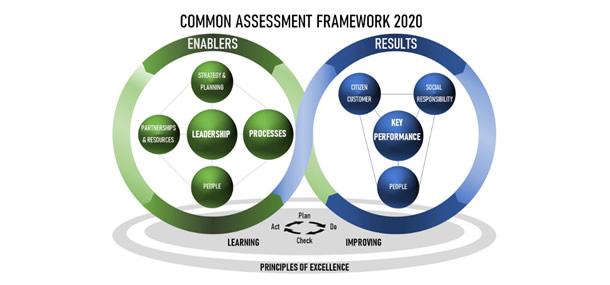About CAF

CAF is a European Common Assessment Framework, a tailor-made QM tool for better quality in public administration. It is a self-assessment tool used jointly by managers and employees to analyse and recognise their strengths and potential for improvement.
The ultimate goal is to achieve excellent results and impacts for customers, citizens and society. Depending on the sector, using CAF can lead to "quick and correct business licences", "well-educated students", "high life quality through public health services", or in general "a comprehensive citizens service", "sustainably managed infrastructure", or "highly motivated employees".
The CAF's core is a sample questionnaire of approximately 200 questions that captures a public administration or organisation's quality. Then, through the CAF Action Plan, an organisation implements the jointly defined improvements.
Depending on the organisation's size, CAF can be introduced for the whole organisation or in single departments.
That is why CAF can be the 'compass' to help managers find the path to Excellence!
For more info about CAF, visit the link

- Tailored for the public administrations
Public administrations develop CAF for public administrations. - Improve the performance of public administrations
CAF identifies organisational strengths and improvement areas while at the same time being sensitive to improvements and measures for further development. - Simple application
The CAF can be used by public administrations on its own or only with little external support. - Quick and sustainable results at low cost
Compared to other quality management tools, results are quickly available. - Sustainability
Self-assessment and quality management with the CAF is the beginning of a continuous improvement process in an organisation. We recommend the regular use of CAF (optimally every two years). - External feedback
With the CAF label, profound evaluation and confirmation by external feedback is possible. - Learning through comparisons and networks
CAF was developed for all public administrations in the EU. Based on the CAF grid, CAF users can compare their own results with others and learn together. - Improving the image of public administrations
CAF leads to a modern, citizen-oriented and efficient organisation that reflects transparency and participation and strengthens public administrations' legitimacy.
CAF wants to achieve an excellent result and impact that has to be measured and proven by facts and figures. It defines five "enablers" that boost the organisation to perform at its best and deliver excellent results for citizens, clients and employees.

Above all is the leadership, which sets the organisation's strategic direction and creates the organisational foundations. Excellent leadership enforces "strategy and planning", "human resources management" and manages resources such as budget, knowledge and IT sustainably. On these bases, the organisation defines and documents the internal "processes" and develops them permanently.
Also, the CAF defines four result criteria to measure the impact of the organisation's services:
- Staff-related results (How satisfied are the employees are with their work in the organisation and their training needs?)
- Citizen-related results (How satisfied are the citizens with the organisation's work (ministry, municipality, school, etc.? How satisfying is the accessibility (via telephone, personally, etc.)?
- Social responsibility results (What is the organisation doing to fulfil its social responsibility?)
- Main performance results (What outputs, outcomes and impacts are achieved depending on the sector (e.g. public transportation, police security, environmental protection, social services, quality of laws, etc.)?
Finally, it develops better services for the citizens and a quick, comprehensive organisation check that enables entry into change management and organisational development.
Before the organisation starts the CAF implementation, it shall define to what extent this project approach can support its objectives and fits the organisational culture itself.
Before deciding whether to start using CAF, ask yourself and your leadership a few questions such as What are my departments doing and what challenges do we see? or How may we improve the processes and products, i.e. services in the given period with in-house capacities and available staff?
CAF implementation goes through three phases:

At the end of the CAF process, an organisation can be rewarded with the label "Effective CAF User" as proof of its effort and excellent work. The CAF label confirms a high degree of efficiency in administrative procedures and service orientation to achieve effective and sustainable improvements for citizens and society.
The management team should discuss CAF implementation. CAF is not an "expert" procedure in which external experts determine what is "good" or "bad" but start a joint organisational development process - a continuous improvement process.
For the smooth running of the CAF program, the organisation undertake the following steps:

1. SETTING UP CAF-PROGRAM STRUCTURE
Information of the employees about the CAF program and engage them in the realisation through united teams is the essence of successful CAF implementation.
Define CAF program roles within CAF program management: a CAF-programme manager leads the CAF process (with the CAF moderator), sets milestones, selects the CAF self-assessment group and is available internally for any questions about the CAF programme, while a CAF program assistance supports the CAF program management and take care of the ongoing issues. CAF self-assessment group is responsible for the CAF self-assessment implementation.
Set communication plan is accompanying project communication focusing on accurate and timely information related to CAF programme implementation using the relevant communication tools.
2. SELF-ASSESSMENT PHASE
Conduct CAF training aims to inform the CAF self-assessment group members about CAF and their specific tasks.
Each CAF self-assessment group member passes through the individual self-assessment phase (which is anonymous and confidential) by answering the CAF grid and focusing on a description of strengths, potential for improvement, and further development and conclusive assessment measures. At the end of this four - to six - week phase, the evaluation grids transmit to the (external) moderation in preparation for the CAF consensus workshop.
CAF consensus workshop is at the heart of the CAF program because the CAF Self-Assessment Group unites and discusses the different perspectives and experiences itself as a strategic unit and administrative development engine.
A moderator does a CAF-self-assessment report and hands it over to the CAF program management. It shows the strengths, potential for improvement and measures for further development as well as the outcome of the discussion (consensus) on all nine criteria of the CAF.
3. CAF-ACTION PLAN
The CAF self-assessment group prepares CAF-Action Plan during the workshop. The plan provides responsibilities and timelines.
CAF-Action Plan Report is based on the CAF-Action plan, and it should be shared with several groups ("CAF Action Groups") that pool together related actions.
4. CAF IMPLEMENTATION
The action plan for CAF implementation requires a timeframe of one to three years. It should be regularly incorporated in the team discussions. The team members should be regularly informed of the project's status and discuss possible challenges.
Carry out ongoing project controlling is important not to lose sight of the implementation and regularly review the project. This central management tool of the CAF program provides essential insights on where support is needed, specific issues that need to be resolved, and whether time and resources are on schedule.
ReSPA and KDZ have realised CAF pilot projects in more than 15 ministries, public institutions and municipalities in the Western Balkans.
Check how the CAF influenced improvements in the institutions:



 Mr. Gentian XhaxhiuProgramme Manager - Coordinator
Mr. Gentian XhaxhiuProgramme Manager - Coordinator Mr. Slaven BukaricaProgramme Assistant
Mr. Slaven BukaricaProgramme Assistant